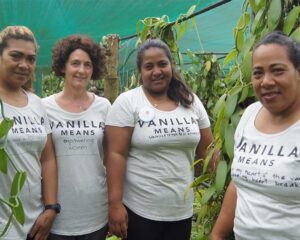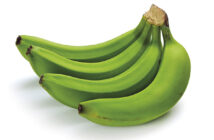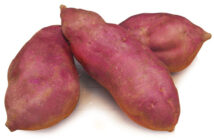
Heilala Vanilla began when New Zealander John Ross flew to Tonga after the 2001 Cyclone Waka tore through the Pacific and left a trail of destruction in its wake. He organised a team of retired builders, electricians, and plumbers from his Papakura Rotary Club to join him on the island of Vava’u to help rebuild infrastructure.
When Ross heard concerns about the island’s future, he suggested reviving the cultivation of vanilla and so the Heilala Vanilla journey began.
Now Ross’s daughter, Jennifer Boggiss, oversees the business and it continues to be recognised for its focus on sustainability and community engagement.
“Sustainability means different things to different people and organisations,” says Boggiss. “To us it’s all about being connected to our purpose which is to empower vanilla growing communities in Tonga and ensure sustainable livelihoods for future generations.
“The communities of Tonga are the lifeblood of our business, and we believe that providing sustainable livelihoods can be achieved through two pillars.
“One is vanilla growing. You can have an impact on community by providing them with income from growing vanilla. The second one is through empowerment. Providing people with processes that will assist them to grow the best vanilla in the world. This includes training, demonstration plots, research, and all the other things that we do.”
Vanilla bean vines grow 20 degrees on either side of the equator and are suitable for smallhold farmers. It is also an especially desirable crop for women as it isn’t particularly physically demanding.
“The vanilla growing practise is very much hands-on in the traditional way and typically grown alongside other crops for the farmer,” says Boggiss.
“From a resilience perspective, if you have droughts or cyclones you don’t want to be reliant on one crop on a farm, so it goes really well alongside other crops. It also is a long-term crop so when you plant it you don’t get anything until the fourth year.”
Once the beans have been harvested, dried under the hot Tongan sun, and cured, it is imported into New Zealand and processed at the Heilala Vanilla factory in Tauranga. Here it undergoes vanilla extraction and turned into vanilla pastes, powders, sugars, and more.
“Some vanilla growers dry it the fast-tracked way, but we still do it traditionally because that’s where the full flavour profile of the vanilla bean is developed,” Boggiss says.
To ensure the company is staying on target in all areas of the business, Heilala Vanilla published its first impact report last year in September 2020 and will repeat this annually.
This includes detailing community initiatives Heilala Vanilla is involved in to compliment the vanilla growing business.
When COVID-19 arrived, the team couldn’t visit Tonga as they normally would, so they had to turn to other ways of supporting the farmers.
“In the last 12 months we have had three projects to deliver on that purpose [of empowering farmers],” Boggis says.
“One was sending two million vegetable seeds to our partners in Tonga who put them into nurseries and then distributed them to households.
“We also sent a container load of desks and chairs for classrooms that didn’t have furniture to two communities that we are part of.”
In the early days of the pandemic the Heilala Vanilla team realised they had the ingredients used in the vanilla extract process necessary to make hand sanitiser which they then sent to three hospitals in Tonga.
Boggiss says over the next year the company is looking to extend its focus on the community and look at the environmental impact “because it goes hand in hand”.
The company has also applied for its B-Corp certification. Certified B Corporations are businesses that meet the highest standards of verified social and environmental performance, public transparency, and legal accountability to balance profit and purpose.
“It is all about how you balance people, planet, and profit,” Boggiss says. “We have submitted our B- Corp assessment, in which we had a really high score, and now we are waiting for certification. In the meantime, we are operating with the mindset that we are a B-Corp company. It was something that really resonated with us because it was who we are and what we stand for anyway. It wasn’t like we had to change everything we had to fit in with it.”
Boggis says she is grateful the company started with a sustainable reason for being.
“If I was advising someone starting out, I would ask them to question what their sustainability drive is. It’s much easier to set it up at the beginning than to get 10 years down the track and have to change things. For us, it’s always been part of who we are.”




























































































